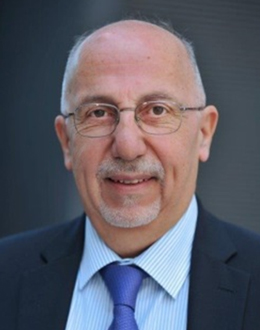THE 4TH INTERNATIONAL
SYMPOSIUM ON THERMAL-FLUID DYNAMICS
(ISTFD 2023)

THE 4TH INTERNATIONAL
SYMPOSIUM ON THERMAL-FLUID DYNAMICS
(ISTFD 2023)

Prof. Tassos G. Karayiannis
Brunel University London, Department of Mechanical and Aerospace Engineering, Uxbridge, UB8 3PH, UK
E-mail: tassos.karayiannis@brunel.ac.uk
Tassos Karayiannis studied at the City University London and the University of Western Ontario. He started his career as a researcher at Southampton University and later as a British Technology Group Researcher at City University. Subsequently he worked at London South Bank University and joined Brunel University London in 2005, where he is now Professor of Thermal Engineering Leader of the Two-Phase Flow and Heat Transfer Group and Director of the Energy Efficient and Sustainable Technologies Research Centre. Professor Karayiannis has carried out fundamental and applied research in a number of single-and two-phase heat transfer areas. Initially he worked on convective heat transfer and subsequently on the enhancement of pool boiling and condensation processes using high intensity electric fields. In parallel, he carried out extensive experimental work in pool boiling heat transfer with plane and enhanced surfaces. Professor Karayiannis has also been very actively involved with research in flow boiling in small to micro tubes and micro-multi-channels. This work involves fundamental studies as well as research leading to the design of high heat flux integrated thermal management systems. He has published more than 260 chapters in books, papers and industrial reports. He chairs the Committee of the International Conference Series on Micro and Nanoscale Flows now in its 8th edition. He is a Fellow of the EI and the IMechE, Member of the Assembly for International Heat Transfer Conferences and the Chairman of the UK National Heat Transfer Committee.
Title: Developments in Flow Boiling in Small to Micro Scale Heat Exchangers
Abstract:There is an increasing need to design heat exchangers that can dissipate very high heat fluxes from small surface areas in a number of applications and industries, including the electronics industry, data centres, small scale refrigeration systems, fuel cells, photovoltaic panels and radar devices. In such applications the heat to be dissipated can reach from a few megawatts per meter square to significantly higher values at local hot spots that can occur due to, for example, high local signal density. Traditional air cooling, and the more recently used liquid cooling, techniques can no longer meet the thermal loads that prevail and help alleviate this thermal bottle neck with preferably small temperature differences between the surface to be cooled and the fluid. Flow boiling in small to micro diameter multichannel heat exchangers is now considered as a possible alternative and this geometry is widely studied internationally. Advantages include very high possible heat transfer coefficients with a very nearly uniform substrate temperature, with the latter essential in reducing thermo-mechanically induced stresses and early component failure. In addition, the high heat transfer rates result in smaller mass flow rates of the cooling fluid required and hence smaller pumping power consumed by the overall thermal management system.
The thermal performance of the small to micro scale multichannel heat exchangers depends, in a complex way on fluid selected, flow and thermal parameter such as mass flow rate, heat flux and inlet degree of subcooling plus geometrical parameters such as channel hydraulic diameter, aspect ratio and length plus surface characteristics. The presentation will include an update on long-term research on the effect of the above parameters on the prevailing flow patterns, heat transfer rates and pressure drop in multichannel heat exchangers. The presentation will include comparative performance of flow boiling in a simple microgap geometry and the effect of surface coatings. Flow instabilities and methods of reducing their occurrence will also be discussed. Finally, recent work on correlations predicting flow pattern transition boundaries, heat transfer coefficients and pressure drop using classical regression analysis and the more recently adopted machine learning methodology will be present. This will facilitate the wide adoption in industry of multi microchannel heat exchangers as part of thermal management systems recommended to cool high heat flux devices.